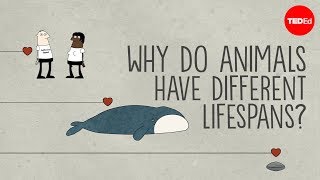(单词翻译:单击)
For the microscopic lab worm, C. elegans life equates to just a few short weeks on Earth.
对于微观实验室中的秀丽隐杆线虫而言,在地球上的生命仅短短几周。
Compare that with the tortoise, which can age to more than 100 years.
与能活100多年的乌龟相比,
Mice and rats reach the end of their lives after just four years,
老鼠们的寿命不过4年。
while for the bowhead whale, Earth's longest-lived mammal, death can come after 200.
但是对于地球上寿命最长的哺乳动物弓头鲸来说,死亡在200年后才会发生。
Like most living things, the vast majority of animals gradually degenerate after reaching sexual maturity in the process known as aging.
正如大部分的生物一样,大部分的动物在达到性成熟之后便逐渐退化,这正是我们所熟知的“老化”。
But what does it really mean to age?
但是老化到底是什么意思呢?
The drivers behind this process are varied and complicated, but aging is ultimately caused by cell death and dysfunction.
这个过程背后有着既多样又复杂的因素,但总而言之,老化是由于细胞的死亡和功能紊乱所导致的。
When we're young, we constantly regenerate cells in order to replace dead and dying ones.
当我们年轻时,身体中的细胞会不断再生来取代死亡或衰竭的细胞。
But as we age, this process slows down.
但是随着我们年龄渐长,细胞再生长过程变缓。
In addition, older cells don't perform their functions as well as young ones.
此外,老化细胞的表现也不如新生的细胞。
That makes our bodies go into a decline, which eventually results in disease and death.
这将使我们身体机能下降,并最终导致疾病和死亡。
But if that's consistently true, why the huge variance in aging patterns and lifespan within the animal kingdom?
但如果事实果断如此,为什么动物们会有差异如此之大的老化模式和寿命长短呢?
The answer lies in several factors, including environment and body size.
答案将包括以下因素,例如环境和体型。
These can place powerful evolutionary pressures on animals to adapt, which in turn makes the aging process different across species.
这些因素在动物适应过程中扮演着重要作用,反之也影响着物种的老化差异。
Consider the cold depths of the Atlantic and Arctic Seas, where Greenland sharks can live to over 400 years,
考虑到大西洋和北冰洋海域的极寒因素,生活在此海域的格林兰鲨鱼寿命长达400多年,
and the Arctic clam known as the quahog can live up to 500.
称为“quahog”的北极蛤蜊寿命甚至长达500年。
Perhaps the most impressive of these ocean-dwelling ancients is the Antarctic glass sponge,
也许在这些海洋生物祖先中,令人印象深刻的莫属南极玻璃海绵,
which can survive over 10,000 years in frigid waters.
在极寒水域中它可存活超过1万年之久。
In cold environments like these, heartbeats and metabolic rates slow down.
在像这样的寒冷环境中,心率和新陈代谢速率减缓。
Researchers theorize that this also causes a slowing of the aging process.
研究者推理认为,这也将减缓老化进程。
In this way, the environment shapes longevity.
因此,环境影响着寿命。
When it comes to size, it's often, but not always, the case that larger species have a longer lifespan than smaller ones.
当涉及体型因素时,通常情况是体型更大的物种比体型较小的物种拥有更长的寿命。

For instance, an elephant or whale will live much longer than a mouse, rat, or vole, which in turn have years on flies and worms.
例如,大象或者鲸鱼比老鼠、大老鼠活着田鼠活得更长,同样,老鼠们的寿命也远超苍蝇和蠕虫数年。
Some small animals, like worms and flies, are also limited by the mechanics of their cell division.
一些小型动物,例如蠕虫和苍蝇,受限于它们的细胞分裂机制。
They're mostly made up of cells that can't divide and be replaced when damaged, so their bodies expire more quickly.
它们体内大部分细胞受损时,既不能分裂也无法被新的细胞取代,因此它们生命衰竭得很快。
And size is a powerful evolutionary driver in animals.
因此体型对动物而言是一个重要的进化因素。
Smaller creatures are more prone to predators.
小型动物更容易受到掠食动物的袭击。
A mouse, for instance, can hardly expect to survive more than a year in the wild.
例如,小老鼠是很难独自在野外存活超过一年。
So, it has evolved to grow and reproduce more rapidly, like an evolutionary defense mechanism against its shorter lifespan.
因此,它必须通过快速成长和繁衍这种进化防卫方式与寿命短来抗衡。
Larger animals, by contrast, are better at fending off predators,
相反,大型动物则能更好地防卫捕食者,
and so they have the luxury of time to grow to large sizes and reproduce multiple times during their lives.
因此它们有足够的时间来成长和进行多次繁衍。
Exceptions to the size rule include bats, birds, moles, and turtles,
体型因素也有例外,比如蝙蝠、鸟、鼹鼠和乌龟,
but in each case, these animals have other adaptations that allow them to escape predators.
这些动物有其他适应方式让它们免遭掠食者的袭击。
But there are still cases where animals with similar defining features, like size and habitat, age at completely different rates.
有些动物虽然有着类似的特征,例如体型和生活环境,但是老化速率却完全不同。
In these cases, genetic differences, like how each organism's cells respond to threats,
对于这些情况,基因的差别,例如每个生物细胞如何应对威胁,
often account for the discrepancies in longevity.
常常影响着寿命的长短。
So it's the combination of all these factors playing out to differing degrees in different animals
因此这些因素的结合在不同动物中有着不同程度的影响,
that explains the variability we see in the animal kingdom. So what about us?
这也说明了为什么我们在动物中看到了寿命的多样性。那么我们人类呢?
Humans currently have an average life expectancy of 71 years,
如今人类平均寿命在71岁,
meaning that we're not even close to being the longest living inhabitants on Earth.
这意味着我们寿命远不及地球上最长寿的生物。
But we are very good at increasing our life expectancy.
但是我们人类很善于延长寿命。
In the early 1900s, humans only lived an average of 50 years.
早在20世纪初,人类平均寿命仅仅50岁。
Since then, we've learned to adapt by managing many of the factors that cause deaths, like environmental exposure and nutrition.
自此以后,我们通过控制诱发死亡的各种因素来延长寿命,例如环境和营养。
This, and other increases in life expectancy make us possibly the only species on Earth to take control over our natural fate.
这种与其他延长寿命方法的结合,将让我们人类成为地球上唯一能主宰自己命运的物种。


